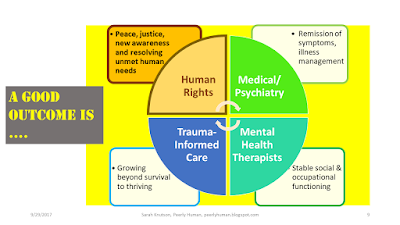
Let's circle back and see how each of the major approaches sees the function of human rights.
1. Disease model psychiatry
Medical model psychiatry tends view to "mentally ill" brains as fundamentally flawed. Brain capacity is compromised by disease. Therefore, what is most important is to 'treat' the 'illness.' Thus, human rights necessarily are of secondary importance to expert opinion and treatment needs.2. Conventional 'talk' therapy
Conventional talk therapy tends to see clients as rationally impaired by historic psychological or relational dysfunction. It is therefore quite skeptical about the judgment of clients. It tends to view human rights as allowable absent a threat to self or others.3. Trauma-Informed Care
Trauma-informed care often views human rights as an important part of a restorative process. It works to balance and re-balance relational power. While attention is given to the risks of traumatic re-triggering, overall protection of human rights is seen as important for victims/ survivors to heal.
4. Human Rights
The human rights perspective pulls no punches when it comes to the importance of human rights. Human rights, literally, are seen as the foundation of peace and justice in the world. Everyone everywhere needs human rights in order to feel well, live well and be well. They are integral to individual and social wellbeing - and the key to a sustainable human future.
That's all for now.
That's all for now.






No comments:
Post a Comment
Please share your thoughts: